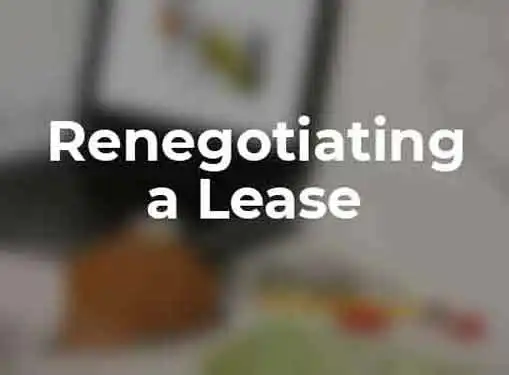Small Business Office Advice
How to Renegotiate a Lease
Renegotiating a lease is an entrepreneurial experience that can go extremely well or horribly wrong. Here's how to renegotiate your office lease and get the best possible deal.
Many business owners are surprised to learn that they don't have to relocate to save a bundle on their lease.

Renegotiation has become a common practice in commercial leasing as entrepreneurs look for ways to make every dollar count. But since better terms and lower rates aren't guaranteed outcomes in renegotiation, here's what you need to know.
Tenants frequently have the upper hand in a renegotiation scenario. Unless the local commercial real estate market is red hot, landlords are hesitant to risk incurring an extended vacancy period by allowing the space to turn over. Yet despite your landlord's eagerness to keep the space occupied, you have to plead your case by citing factors that justify better terms in a renegotiated lease.
Decreased Sales
A dramatic decrease in sales can make it very difficult for a tenant to maintain rent payments at their current level. Landlords may be willing to work with an existing tenant to find a solution that allows them to stay in the space. If a full lease reduction isn't possible, you may be able to renegotiate a lease based on a giving the landlord a percentage of sales that surpass a specified baseline amount.
Decreased Traffic
Just like businesses, neighborhoods rise and fall. If the amount of traffic in your neighborhood has suffered a noticeable decrease, the value of the space has decreased and you may be able to persuade your landlord to accept a reduced lease at current market value.
Vacancies
A rash of vacancies in the surrounding units can signal a decline in the neighborhood, the rental building, or both. Landlords know that space in a largely vacant building isn't worth as much as space in a building with near full occupancy. You can use that information to your advantage in a renegotiation, especially if you know the landlord's back is against the wall.
Building Decline
Rental buildings require just as much maintenance as those that are privately-owned. Although tenants are responsible for maintaining their own spaces, the responsibility for maintaining common areas usually falls on the landlord. If the quality of common areas and landscaping is in decline, you clearly have grounds for renegotiation. But the bigger question should be whether you really want to remain in a space with deteriorating surroundings.
Market Changes
Before you even think about renegotiating your lease, it's important to do some research about the commercial real estate market in your area. If rates have declined, you have a ready-made argument for a lease reduction. But if rates are increasing, you may want to reconsider how aggressively you pursue your request for a better deal.
The best time to renegotiate a lease is six months to a year before your current lease expires. If the renegotiation fails, you will at least have enough time to properly consider alternative locations. At all costs, try to avoid a scenario in which you a failed negotiation forces you to relocate at the last minute.
Share this article
Additional Resources for Entrepreneurs


Conversation Board
Please provide any additional tips you might have on how to renogiate a lease. Post a comment below.